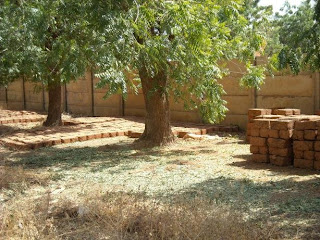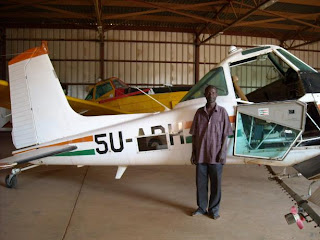Notice the word "Coiffeur" or hairdresser on the straw door to the shack.

As in so many places in Africa, people use mud bricks to build many structures.

Sometimes, however, they use wicker. These people are squatters and have no services whatsoever.

Zoom in to see the great use of metalic bottle tops as washers to ensure that the nails do not rip the through cardboard that makes up the walls.

Djibo, pictured below, is a mechanic with the air pesticide patrol - the so-called "Protection des végétaux" - and he and I had lunch together today.

I had been to his hangar a few times already to open and close the taps, as my colleagues and I open and shut valves on the network to see if we could pinpoint a leak and understand how the system was organised (we didn't). After a few stops, he was about to sit down for lunch and asked me to join him for some beef stew and French bread. He insisted, and I couldn't refuse without offending him. The stew was spicy and very good, and very much like the stews I used to eat in Uganda. It was warm and so I decided that it would be safe. I stuck to the sauce so as not to deprive this generous man of his lunch.
We had a great conversation about how he came to be a mechanic on this small Cesnas that fly crop duster missions to kill the various species of crikets, buggers, and - he leaned over to tell me softly - sometimes birds that destroy the crops that are so badly needed in the country. Such kind and warm welcome just doesn't happen in Europe or in the US anymore (or rarely); I just hope that my stomach won't make me regret it.
I have been struck so far by how well people speak French. I daresay their French is much easier to understand than some Anglophone Africans' English, particularly Liberians.
No comments:
Post a Comment